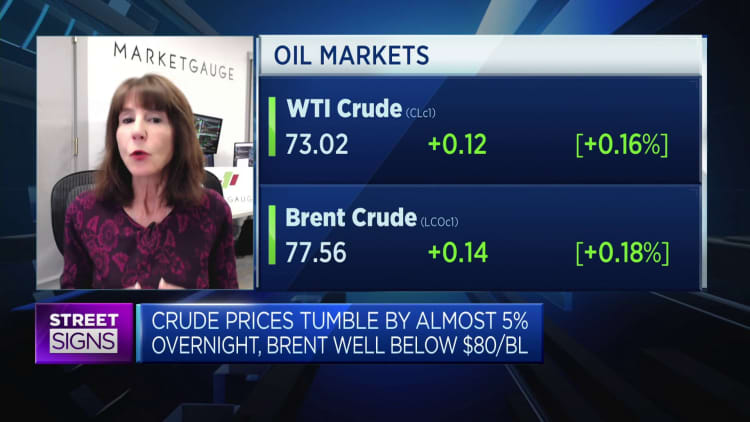We expect to breakeven by 2025, says Xpeng’s president
Chinese electric car company Xpeng’s deliveries exceeded 40,000 units in the third quarter of 2023. Subsequently, the automaker predicts that vehicle deliveries will surge to between 59,500 and 63,500 in the fourth quarter.
“The earnings we announced actually has shown very encouraging signs of renewed growth for the company … with further growth expected for the current fourth quarter,” Brian Gu, vice chairman and president of Xpeng told CNBC’s “Street Signs Asia.”

He added that Xpeng has seen “meaningful profit margin improvement starting the fourth quarter,” thus anticipating a positive margin and stronger cash flow going forward.
Gu also expects Xpeng to improve its profitability and breakeven by 2025.
— Quek Jie Ann
Oil prices little changed on Friday, set for fourth week of falls
Oil prices were little changed on Friday but were set for the fourth straight week of declines after hitting four month-lows in the previous session.
The price of U.S. crude oil fell 5% on Thursday as inventories rose while slowing industrial activity raised concerns about waning demand.
The West Texas Intermediate inched 0.14% higher at $73 a barrel in Asia trading hours, while the Brent gained 0.11%, to $77.54 a barrel.

U.S. crude and the global benchmark both traded at their lowest level since early July on Thursday.
“The shift lower was likely driven initially by oversupply concerns,” Commonwealth Bank of Australia analysts wrote in a note. “Demand concerns added to oversupply narrative, particularly with U.S. continuing jobless claims rising to the highest level in almost two years.”
— Shreyashi Sanyal
Philippine peso strengthens to 3-month high after central bank leaves rate unchanged
The Philippine peso edged 0.14% higher against the U.S. dollar in early afternoon trading on Friday.
The peso traded at 55.620 per dollar, strengthening to its highest level since early August a day after the Bangko Sentral ng Pilipinas held interest rates at 6.5%, as expected.
The central bank also signaled that the country’s inflation outlook is steadying, but warned that it could raise interest rates if prices rise.

“BSP maintained a hawkish stance and remains prepared to resume tightening if necessary,” Tommy Wu, senior economist at Commerzbank, wrote in a client note.
“All in all, with the balance of risks to the inflation outlook tilted to the upside, BSP would have to maintain its hawkish stance to keep inflation expectations anchored.”
— Shreyashi Sanyal
Alibaba shares plunge 9% to a 12-month low after scrapping cloud spinoff plans
Signage at the Alibaba Group Holding Ltd. offices in Beijing, China, on Wednesday, March 29, 2023. Alibaba’s overhaul could serve as a template for a restructuring of China Tech itself: a shake-up that achieves Beijings aim of carving up the countrys tech titans while unlocking potentially billions of dollars in pent-up shareholder value.
Bloomberg | Bloomberg | Getty Images
Shares of Alibaba plunged 9% in early Hong Kong trading on Friday after the Chinese e-commerce giant said it would not proceed with the full spinoff of its cloud group due to U.S. chip export restrictions.
Alibaba shares fell to their lowest level since late November last year, last trading at about 73 Hong Kong dollars. Hong Kong-listed shares of the company have fallen over 13% since the beginning of the year, underperforming the main Hang Seng index’s 11.2% YTD decline.

The company reported quarterly earnings on Thursday, with net income of 27.7 billion yuan ($3.8 billion) for the September quarter, below the 29.7 billion yuan expected by analysts.
Revenue met expectations at 224.79 billion yuan, up 9% year over year.
Alibaba also announced it will issue its first-ever annual cash dividend in 2023. Dividends are a way of sharing a portion of profit made by companies with their shareholders.
The company’s board approved an annual $0.125 per ordinary share or $1 per American depositary share cash dividend for the fiscal year.
— Shreyashi Sanyal, Ryan Browne
CNBC Pro: Time to buy Siemens and HelloFresh after big share price moves? Here’s what analysts say
Singapore’s non-oil domestic exports slump at slowest pace in a year
The Merlion statue in Singapore, on Tuesday, Jan. 3, 2023. Photographer: Lionel Ng/Bloomberg via Getty Images
Lionel Ng | Bloomberg | Getty Images
Singapore’s non-oil domestic exports continued to slump in October but at its slowest pace in one year, government data showed.
Singapore’s NODX fell 3.4% last month, down for the 13th straight month. It was also the smallest decline since October 2022.
The decline in October was mainly driven by a slowdown in exports of both electronics and non-electronics in key markets like Taiwan, U.S. and South Korea.
Last month’s reading still showed an easing from the 13.2% contraction seen in September.
— Shreyashi Sanyal
CNBC Pro: Morgan Stanley’s analyst just struck a cautious tone on Alphabet. Here’s why
Google parent Alphabet has been among the so-called “Magnificent Seven” stocks that investors have been looking at favorably this year — but one analyst has some reservations.
Morgan Stanley is overweight on the stock, but equity analyst Brian Nowak struck a cautious tone when talking to CNBC, especially when compared with Meta and Amazon.
It comes after the bank cut its price target on Alphabet from $155 to $150, giving it upside of 11.4% from its close on Nov. 15.
CNBC Pro subscribers can read more here.
— Amala Balakrishner
Dow closes lower
The Dow Jones Industrial Average closed lower on Thursday, although all three major indices notched weekly gains.
The 30-stock index slid 46 points, or 0.13%, to close at 34,945.57. The S&P 500 added 0.12% to finish the session at 4,508.24, while the Nasdaq Composite climbed 0.07% to 14,113.67.
— Lisa Kailai Han
U.S.-China relations will still be defined by ‘competitive confrontation,’ analysts say after Biden-Xi meeting
Wednesday’s high-stakes Biden-Xi meeting left analysts with slight reassurance that both countries are keen on establishing a line of communication—but also maintained the belief that U.S.-China relations will remain competitive.
“We think the meeting shows the intention from both sides to restore bilateral relations. This could help reduce near-term risk of escalatory confrontation,” Morgan Stanley analyst Robin Xing wrote in a Thursday note. “But ‘competitive confrontation’ will likely remain for now, which does not mean a complete decoupling, but instead continued tech competition and de-risking away from China.”
This also indicates a continued reduction in direct foreign investment and technology spillover to China, Xing said, which could weigh on China’s long-term growth outlook. Moving forward, the analyst believes that further stimulus and reforms in China are needed to help stabilize market confidence in the country.
“As China risks tripping into a debt-deflation loop, we think more growth opportunities are needed to retain foreign investors, together with efforts to diversify the supply chain and strengthen its economic relations with other key trading partners,” Xing said.
According to Piper Sandler analyst Andy Laperriere, the economic and geopolitical relationships between the U.S. and China will remain locked in competition. Both countries are in a “cold war,” he said, expecting the U.S. to maintain its tariffs on Chinese imports and further tighten restrictions on what China can buy and how U.S. businesses can invest in China.
— Pia Singh
Softer inflation data doesn’t mean good news just yet for markets, says BTIG
November’s red-hot stock rally means that some investors believe that the Federal Reserve could pull off a soft landing. But BTIG analyst Jonathan Krinsky isn’t as quick to jump to the conclusion.
“Bulls will cite the inflation data and resilience of cap-weighted indices as signs that a ‘soft-landing’ is here. Bears will cite slowing macro data, company-specific commentary, and persistent weakness of the average stock as signs that a ‘hard landing’ is on the horizon,” the analyst wrote. “We continue to find ourselves in the latter camp, and today’s data and price action are certainly not doing much to dissuade us from that view.”
Historical track records also show a similar pattern of rallies prior to a recession, Krinsky noted.
“If we look at all recessions ex-Covid over the last 50 years (’07, ’01, ’90, ’80-’82, and ’74), the common trait was there was a period where rates were falling and stocks were rallying. Ultimately as the reality of the recession set in, stocks began to fall,” he said.
The analyst added that the biggest tell for a recession will be any sign of “meaningful weakness” from mega-cap tech stocks, combined with lower rates.
— Lisa Kailai Han
U.S. crude oil dives as supply rises amid demand worries
The price of U.S. crude oil fell 5% on Thursday, as inventories rose while slowing industrial activity raised concerns about softening demadn.
The West Texas Intermediate December contract fell $3.76, or 4.9%, to settle at $72.90 a barrel, while the Brent January contract tumbled $3.81, or 4.69%, to $77.37 a barrel. U.S. crude and the global benchmark were both trading at their lowest level since early July.
U.S. crude inventory rose by 3.6 million barrels this week, while the Federal Reserve reported that industrial production and manufacturing declined in October.
— Spencer KImball

